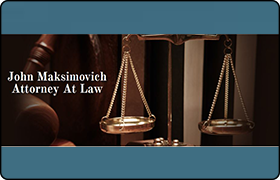Boone Grove Misdemeanor Lawyer, Indiana
Sponsored Law Firm
-
 x
x

Click For More Info:
-
John Maksimovich
1946 North Main Street Crown Point IN 46307-2340 » view mapCriminal Defense Over 35 Years of Experience
When your life is on the line you need the best criminal trial lawyer who understands court trial law inside and out.
800-749-9521  John Maksimovich Crown Point, IN
John Maksimovich Crown Point, INAttorney At Law - IN, 1980
Indiana University, J.D. - 1980
 Legal Services
Legal ServicesClick here to learn more about our firm
 Contact UsEmail or Call 24/7
Contact UsEmail or Call 24/7Call today for your initial consultation.

 Legal Services
Legal Services Contact UsEmail or Call 24/7
Contact UsEmail or Call 24/7
